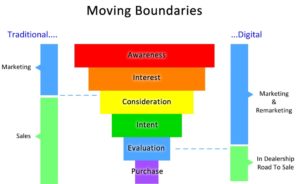
Each month Gordon gives an insight into building a software testing business. Each post has a focus on a particular aspect of the business. Browse the other posts of the Huddle Start-Up series here.
Introduction
Last month I looked into ways in which you can find help for your business. This month, I’ll be talking through the difference between Sales and Marketing.
Originally I thought perhaps this is too silly a title. They both have definitions and conclusions can be reached quickly on the surface. But research a little deeper, or more to the point, put things into practice and you see that the lines are blurred and indeed have changed over the years.
These are all thoughts from my experience at my start-up company, CodeFuse. For a part-by-part breakdown of this blog series please see Part Zero.
Goals and Costs
Marketing and Sales can have different goals for different organisations. Some firms may purely focus on customer acquisition, some on revenue generation and some on increasing profit for example. Many of the same tactics or strategies to get to a negotiating point may remain the same though.

Sales and marketing can be more work than anticipated, especially if you are a start-up with no experience. The amount of time spent and cost of the following can be staggering:
- Crafting a sharp message that connects with customers
- Making your website communicate that message well
- Getting RELEVANT contact names
- Researching data and unearthing contact details
- Crafting email campaigns
- Picking up the phone, again, again and again
- Understanding and preparing materials for your sales process
Of course there may be ways to side-step this level effort such as:
- References from existing customers (or others)
- Partnerships with other firms
Cost of Acquisition (CoA) is a real problem for start-ups. There is an excellent blog post here (ominously titled Startup Killer) which goes into this issue in some depth.
So, What IS the difference?
Let’s take a look at some stock definitions from Merriam-Webster:
- Marketing: The process or technique of promoting, selling, and distributing a product or service
- Sales: Operations and activities involved in promoting and selling goods or services.
Great! Clear as mud.
Why it is tricky to make a clear separation is apparent though if we look into purchasing funnels. A traditional purchasing “funnel”, will model prospective customers moved from an “Awareness” stage, to an “Interest” stage, to a “Desire” stage and finally to an “Action” stage. This is the AIDA model.
But as in many areas, the Internet is disruptive. The diagram below (borrowed from here) expands on the AIDA model a little, demonstrates this nicely.

With prospects able to do more themselves via the Internet (including research and evaluation of products) the marketing remit has grown.
Marketing still includes old tried-and-tested activities such as cold-calling, events such as trade shows and product placement. It also includes Internet-specific activities such as Search Engine Optimisation (SEO). Some activities, say email newsletters, are largely the same as an old activity but delivered using a different medium.
Depending on your business perhaps sales too has not changed a great deal. But for more and more businesses, the old image of a salesman “getting a signature” died long ago. But it must still be there. Somehow a company needs to prompt clients to hand over hard earned money!
The difference may just be that while digital marketing is easy to grasp, digital sales is a lot more subtle. Increasing awareness and interest especially is actually better served by being unsubtle. Digital sales can often be about cleverly moving people to a payment page, removing content that may deter people and making the whole process as frictionless as possible. This is the same on the web as it used to be over sales lunches.
Conclusion
I hope this has been an interesting discussion of sales and marketing for start-ups and has provided some guidance at least on things to think about when starting out in this area of your own business. It is an area that needs much thought to avoid spending a lot of time and money for little return. Spend time getting it right and reap the rewards.
Next month is the final part in this series and we’ll take a look at building a product!
About The Author
 Gordon is the founder of CodeFuse Technology. CodeFuse reduces software development time by making regression testing faster, better and easier. Gordon graduated with a 1st class degree in Computer Science and Artificial Intelligence at Sussex University and also holds an MBA from Imperial College with a specialisation in Entrepreneurship. He has worked successfully for blue-chip, SME and start-up companies. His passion is software quality and making sure that continuous improvement is used to enhance quality efforts across the entire development lifecycle.
Gordon is the founder of CodeFuse Technology. CodeFuse reduces software development time by making regression testing faster, better and easier. Gordon graduated with a 1st class degree in Computer Science and Artificial Intelligence at Sussex University and also holds an MBA from Imperial College with a specialisation in Entrepreneurship. He has worked successfully for blue-chip, SME and start-up companies. His passion is software quality and making sure that continuous improvement is used to enhance quality efforts across the entire development lifecycle.